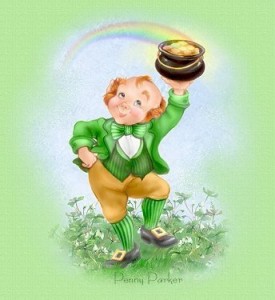Maiden to Married, German to Irish!
“There are only two kinds of people in the world, The Irish and those who wish they were.”
—Anonymous
 Yesterday, Jimmy and I attended our friends’ civil union. One of the ladies is taking the other lady’s name, just as I did–took Jimmy’s name–many years ago. Since learning this I have been thinking of my old (“maiden”) last name, and with today being St. Patrick’s Day, I decided to look up the origins of both names. I have Irish in my blood, but learned here that my name was German.
Yesterday, Jimmy and I attended our friends’ civil union. One of the ladies is taking the other lady’s name, just as I did–took Jimmy’s name–many years ago. Since learning this I have been thinking of my old (“maiden”) last name, and with today being St. Patrick’s Day, I decided to look up the origins of both names. I have Irish in my blood, but learned here that my name was German.
Maiden name: Harmon
This unusual and interesting surname has a very ancient history. It is one of the Norman forms of the Germanic personal name “Hermann”, composed of the elements “heri, hari” meaning army, plus “man”, man. The first known bearer was “Arminus”, the 1st Century leader of a tribe called the “Cherusci”, recorded by the Latin historian Tacitus. The popularity of the name is borne out by the large number of surnames it has generated throughout Europe; in England the inherited Norman forms existing in the modern idiom are Hearmon, Harmon, Herman, Harmon, Harmond, Harmant, and Hermon. The name development includes: Robert Hereman (1196, Norfolk), William Heremond (1296, Sussex), and John Harman (1327, Suffolk). London Church Records list the marriage of Constantine Harmon to Margaret Fenton, on October 31st 1570 at St. Mary Abchurch, and John Harmon to Alice Mason, on October 10th 1572 at St. Botolph’s, Bishopsgate. A Coat of Arms granted to a Harmon family is silver, in base a red crescent issuant therefrom a green rose branch, blue flowered. The first recorded spelling of the family name is shown to be that of Willelmus Hermannus, which was dated 1141 – 1149, in the “Records of Holme”, Norfolk, during the reign of King Stephen, known as “Count of Blois”, 1135 – 1154. Surnames became necessary when governments introduced personal taxation. In England this was known as Poll Tax. Throughout the centuries, surnames in every country have continued to “develop” often leading to astonishing variants of the original spelling.
Married name: Madden
Recorded as Madain, Madden, Maddin, Madigan and MacAvaddy, this is a famous Irish surname. It derives from the pre 10th century Olde Gaelic name O’Madain, translating as the descendant of the son of the hound. The hound is famous in Gaelic heraldry having the virtues of speed, endurance, and loyalty. Most Irish surnames originate from a chief’s nickname. O’Kennedy, for instance means the male descendant of the ugly headed one! The O’Madain’s originated from lands on the River Shannon in County Galway, at one time holding over 25,000 acres. Even today nameholders are still numerous in that part of Ireland. The Madigan branch of the clan are regarded as almost exclusively a Clare-Limerick family, although a branch are to be found in Counties Antrim and Derry in Ulster. Richard Madden, (1798 – 1886) was the author of the book ‘The United Irishman’, whilst many name holders emigrated to either America or England during the infamous ‘Potato Famine’ of 1846. Walter Madden, his wife Mary and their children Richard aged five and Alice, a baby sailed from Galway, bound for New York on the ship ‘Junius ‘ on May 1st 1846. The first recorded spelling of the family name is believed to be that of Dermot O’Madadhain. This was dated circa 1100 a.d. He was chief of the Ui Maine, Connacht, during the reign of King Henry Ist of England, known as ‘The Just”, 1100 – 1135. Throughout the centuries, surnames in every country have continued to “develop” often leading to astonishing variants of the original spelling.1135.
Sources:
http://www.surnamedb.com/Surname/Harmon
http://www.surnamedb.com/Surname/Madden








